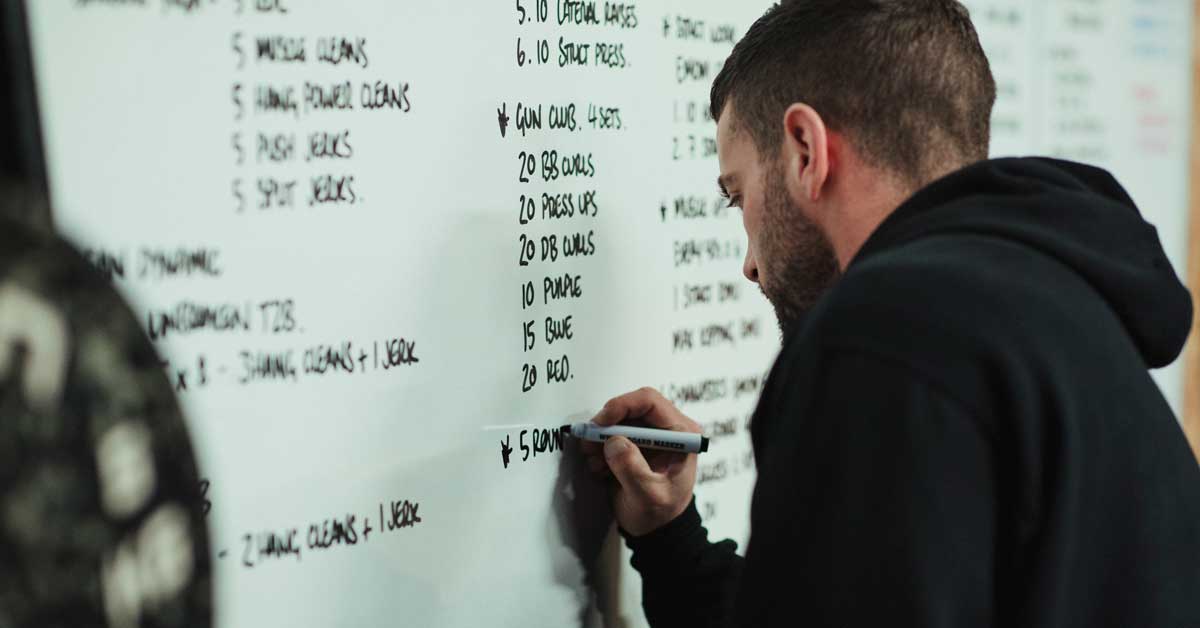In 2016, I finished my bachelor’s degree, knowing I wanted to become a collegiate S&C coach. While it was only an idea at that time, I made it a reality when I passed my CSCS in May 2018, and three months later I decided to leave my halfway-decent career to get my master’s degree in strength and conditioning studies.
Pursuing postgraduate studies has transformed my coaching style and afforded me a chance to participate in numerous additional learning opportunities. Through both online and in-person internships, I have learned firsthand from many great coaches and staff at institutions across the country. Based on my unique experience in the field of S&C, here are 10 useful tips for all young coaches trying to navigate their career trajectories.
1. Live Close to Your Internship
You’ll want to be less than a 15-minute drive from your internship. If you plan to be an intern where you did your undergrad, go ahead and jump to tip #2. If you decide to do an internship halfway across the country, pay attention.
During my graduate degree internship, I lived with a close friend of mine who was 45 minutes away from the university. For a standard 9-to-5 job, a 45-minute commute is not bad. For a full-time coach who is potentially on campus from 5 a.m. to 6 p.m., it can be brutal. Often, by the time I got home, I had just enough time to shower and pack my lunch before I went to sleep, all so I could wake back up by 4 a.m.
You will likely not have a fixed schedule. You will have breaks during the day, and sometimes you will need to get away. We all got into this field because we want to have a positive impact on young lives, but at the same time, you have to be able to take care of yourself. One thing I did to get out of the “office” was pick up all the orders for the nutrition center. I got to leave the facility, and it made me look good since I always volunteered to do it.
2. Show Up Ready to Work
Other articles might suggest that if you are not the first one there, then you are not hungry enough for this industry. On the first day of my graduate internship, my boss said, “Show up on time, and you will be good to go.” He also said, “Please don’t be that guy waiting at the door at 4:15 a.m.” If the coach says be there by 5:00, be there on time, at the minimum. Five to 10 minutes early is enough. Getting there 45 minutes early just means sitting in your car, since you don’t have a key to the facility.
The moment you walk through that door, be ready to move. This is not the office, where you can relax for a little bit, drink some coffee, and slowly ease into the day. Share on XThe moment you walk through that door, be ready to move. This is not the office, where you can relax for a little bit, drink some coffee, and slowly ease into the day. You are about to have 75 football players come in, and every second of prep time matters. It is far better to get everything set up first and then relax, rather than vice versa.
At one of my internships, coaches were supposed to be there by 5:15. Most of us rolled in by 5:10 at the latest. We started getting set up immediately, and most of the time we were done when athletes started rolling in for pre-workout nutrition.
3. Bring Your Own Pen, Clipboard, and Workouts
I picked this up while I was in grad school: Always have a writing implement, a writing surface, and the day’s workout and warm-up. Nothing makes you look more like a novice than not knowing where you are in the workout. You will always need a pen to write notes and observations from the workout.
For example, at one institution we had an EliteForm system, which measures bar velocity. If an athlete moved 75% of their max at an average velocity of .7 m/s, that showed their training max needed to be bumped in the system we were running. Write that down! You will not remember it at the end of the day. Writing down nuggets of information as they happen will almost certainly answer your questions down the line. Coaches I’ve worked with have all lauded the virtue of paying attention to details as a key to becoming a better coach.
4. Shut Up and Listen (aka Practice “Active Listening”)
At the beginning, go in with an open mind and do what you’re told. Whether this is your first internship or your fourth, I strongly suggest that, in your first week or two, you just sit back and observe the coach’s style with athletes. If you are interning at a D1 or under a Master Strength & Conditioning Coach (MSCC), just listen and learn.
Most places will probably tell you to be on the sidelines anyway. This coincides with the previous tip—by listening and watching, you are bound to pick up some useful information to write down. They are at that level or earned that specific title for a reason. Most important of all, use your observations to generate smart questions.
5. Do Not Be a Robot
Athletes are people too. And I cannot stress this enough: Do not be so focused on S&C that you forget to talk to and get to know athletes. It is okay to be affable with athletes to an extent, but you should always remember that you are in a position of authority. For me personally, I have found that the more an athlete trusts you, the better their buy-in. Crack jokes with them, be there for them, and just be the voice of reason.
I cannot stress this enough: Do not be so focused on S&C that you forget to talk to and get to know athletes. Share on X6. Remember, It Is Just Business
The head S&C at one institution said this in the first week of the football off-season: “It’s just business.” What goes on in the weight room is just business, and collectively we are in the business of making athletes better. Coach them hard and love them harder.
At the end of the day, if a student-athlete decides to transfer or quit, it is their decision. For instance, one of the players I got close to chose to transfer mid-semester. I was disappointed that he left, but at the end of the day he did what he thought was best for him. From a business perspective, you move on and focus on the athletes you have and try to make them better.
7. Don’t Forget About Nutrition
I was fortunate at one of my internships to have access to the nutrition center, where I had dinner four nights a week. Suffice to say, I stumbled on a good deal. If you are like me and have a singular focus on your career, you will be there 10-12 hours a day. You need to learn how to meal prep and meal prep for cheap. PB&J, rice & beef, broccoli & chicken—you get the idea. A coach I met during grad school had his weekly grocery plan dialed in at $36.28 a week. He kept it simple and cheap.
You can cook bulk amounts of beef and rice at the beginning of the week, and it will last you several days. Also, throw into your lunch bag more snacks than you think you will need. It is okay if you do not eat all your snacks that day, but at the end of the day you will always wish you had more food rather than not enough.
Try your best to have a balanced diet. The coaching life is grueling, so make sure you keep yourself healthy. Working with athletes will expose you to a lot of potential for illness. Keep your machine running right and you will (hopefully) avoid getting sick.
8. Balance Your Free Time
If this internship is during your final semester, I strongly suggest that you do not take any additional classes with it. I made that mistake while doing my graduate internship. Your weekends end up getting devoted to class, and boom! there goes your free time. If you have a significant other or major family obligations, you will want to communicate with them prior to the internship that you are going to be busy for the next 4-6 months.
On the other hand, if you need to get a part-time job to help with some bills, talk to your supervisor beforehand. They might be able to help you find a position in the university and, based on my past experience, help you balance the responsibilities of classes, internships, and work. You have to be extremely dialed-in to manage all of it, but communication with your coach supervisor is paramount.
9. Do Not Chase Logos
Just because you interned at X University does not mean you are an amazing coach. An internship at X University might look great on a résumé, but the experience you get may be a little different than what you expect. I’ve had friends intern at major universities (football and Olympic), only to end up cleaning for the semester. No coaching, no intern education, nothing. I am not saying all schools are like that, but you need to be cognizant of the type of internship program you are thinking about joining, especially if getting hands-on experience matters to you.
Be cognizant of the type of internship program you are thinking about joining, especially if getting hands-on experience matters to you. Share on XSome questions to ask during your program interview are:
- What elements does the internship curriculum include?
- What are some of the duties assigned to interns?
- What is the path to working my way up to coaching athletes?
- What are some qualities of past interns that have made them excel?
You have to remember you are there to learn! If you only stand in the corner and clean after every session, and that’s the extent of your internship, you are not really getting much out of it (other than observation and taking notes, to which I would refer to point #4.) If you think chasing a specific logo is how you will become a better coach, you may need to rethink your priorities. Also, just as a side note—go in with the mindset that you will be doing a lot of cleaning, especially given the shifts in our standards during the COVID-19 era.
10. Enjoy the Process
Enjoy the process, learn to accept criticism and feedback, and take the opportunities where they come. If you get to run a warm-up or session or assist with programming, take the opportunity and do it well. The more responsibility you earn, the more likely you will enjoy the process. Above all, consider your internship a test of whether or not this is the career path for you. The barriers of entry into S&C are high, and an internship is absolutely vital if your goal is to become a strength and conditioning coach at any level.
Above all, consider your internship a test of whether or not this is the career path for you. Share on XI hope these tips will help maximize your experience at any level and throughout your journey in this industry. Even for myself, as I search for my next opportunity, I try to keep all of these in my mind. Our lives were fundamentally altered this year, for better or worse, and our job is to adapt to the changes. Especially for a young coach, being able to adapt to any situation is extremely important. Please feel free to reach out to me—I am always excited to talk S&C with others and expand my network.
Since you’re here…
…we have a small favor to ask. More people are reading SimpliFaster than ever, and each week we bring you compelling content from coaches, sport scientists, and physiotherapists who are devoted to building better athletes. Please take a moment to share the articles on social media, engage the authors with questions and comments below, and link to articles when appropriate if you have a blog or participate on forums of related topics. — SF





